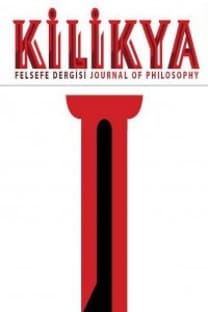Wang Yangming’in “Sezgisel Bilgi” Kuramı: Eylemde Zihinsel-Spiritüel Bütünlük
Wang Yangming, sezgisel bilgi, ahlaki farkındalık, kişisel gelişim, zihinsel-spiritüel bütünlük
“Intuitive Knowledge” Theory of Wang Yangming: Mental-Spiritual Integrity in Action
Wang Yangming, intuitive knowledge, moral awareness, personal growth, mental-spiritual integrity,
___
- Baird, F.E. (2016). From Plato to Derrida. New York: Routledge.
- Bengson, J., Moffett, M.A. (2011). Knowing How: Essays on Knowledge, Mind and Action. New York: Oxford University Press.
- Chan, L. (1991). You Wu Zhi Jing 有无之境 (Varlığın ve Yokluğun Âlemi). Shanghai: Shanghai Renmin Chubanshe.
- Chen, S. (2008). Ti Zhi Yu Renwen Xue 体知与人文学 (Özsel Bilgi ve Beşeri Öğreti). Beijing: Huaxia Chubanshe.
- Chuanxi Lu 传习录 (Pratik Yaşam Yönergesi). (2018). Wang Xiaoxin (ed). Beijing: Jiuzhou Chubanshe.
- Darity, W. A. (2008). International Encyclopedia of the Social Sciences: Ethnic, Inequality, Gender. Detroit: Macmillan Reference.
- Davidson, D. (1980). Essays on Actions and Events. Oxford: Clarendon Press.
- Daxue 大学 (Büyük Bilgi). (2015). Nanchang: Ershiyi Shiji Chubanshe.
- Dennett, D. (1991). Consciousness Explained. New York: Black Bay Books.
- Dewey, J. (1963). Experience and Education. New York: Collier Books.
- Er Cheng Ji 二程集 (Cheng Kardeşler Koleksiyonu). (2004). Wang Xiaoyu (ed). Beijing: Zhonghua Shuju.
- Fang, K. (1997). Zhongguo Zhexue Shi Shang De Zhixing Guan中国哲学史上的知行观 (Çin Felsefe Tarihinde Bilgi ve Eylem Görüşü). Beijing: Renmin Chubanshe.
- Fidan, G. (2017). Konfüçyüs Konuşmalar. İstanbul: Dedalus Kitap.
- Geng, N. (2012). Xin De Xianxiang: Geng Ning Xinxing Xianxiang Xue Yanjiu Wenji 心的现象—耿宁心性现象学研究文集 (Zihin Olgusu: Geng Ning’in Zihin ve Fıtrat Fenomonolojisi Derleme Eserleri). Beijing: Shangwu Yin Shuguan.
- Huang, W., Wei, H. (2007). Wang Yangming “De” Fanchou Lunxi 王阳明“德”范畴论析 (Wang Yangming’in “Ahlak” Tasnifi Analizi ). Lilun Xuekan 159(5), 101-103.
- Huang, Y. (2006). A Neo-Confucian Conception of Wisdom: Wang Yangming on the Innate Moral Knowledge (Liangzhi). Journal of Chinese Philosophy 33(3), 393-408.
- Hume, D. (2000). A Treatise of Human Nature. Oxford: Clarendon Press.
- Hume, D. (1962). Enquiries Concerning the Human Understanding and Concerning the Principles of Morals. Glasgow-New York: Oxford University Press.
- Lunyü 论语 (Konuşmalar Kitabı). (2018). Nanjing: Jiangsu Fenghuang Kexue Jishu Chubanshe.
- Mengzi 孟子 (Mengzi Klasiği). (2017). Beijing: Zhonghua Shuju.
- Özerdim, M. N. (2000). Konuşmalar-Konfüçyüs. İstanbul: Çağdaş Matbaacılık.
- Özerdim, M.N. (1963). Büyük Bilgi ve Müzik Hakkında Notlar. Ankara: Milli Eğitim Basımevi.
- Peng, Q. (2010). Mengzi Jingdian Quanshi Fangfa Zai Sikao 孟子经典诠释方法再思考 (Mengzi Klasiği Yorumlanma Yönteminin Yeniden Değerlendirilmesi). Jianghai Xuekan 6, 48-54.
- Rorty, R. (1980). Philosophy and the Mirror of Nature. New Jersey: Princeton University Press.
- Sertdemir, İ. (2021a). Çin Düşünce Geleneğinde İnsan Doğası Kuramı ve Ahlaki Davranış Yöntemleri. Doğu Asya Araştırmaları Dergisi 4(8), 28-53.
- Sertdemir, İ. (2021b). Konfuçyüsçü Düşüncenin İdealist Kanadı Mengzi’da Ahlaki Psikoloji. Ankara: Gece Kitaplığı.
- Shujing Jichuan书经集传 (Belgeler Klasiği Derlemesi). (2018). Beijing: Zhongguo Shudian Chubanshe.
- Tubbs, N. (2009). History of Western Philosophy. London: Palgrave Macmillan.
- Wang, Y. (2018). Wang Yangming Quanji 王阳明全集 (Wang Yangming Koleksiyonu). Beijing: Zhongyang Bianyi Chubanshe.
- Wu, Z. (2018). Zuowei Liangzhi Lunli Xue De “Zhixing He Yi” Lun Yi “Yi Nian Dong Chu Bian Shi Zhi Yi Bian Shi Xing” Wei Zhongxin 作为良知伦理学的“知行合一”论以“一念动处便是知亦便是行”为中心 (“Bilgi ve Eylem Birliği” Kuramının Sezgisel Bilgiyle Ahlak Öğretisinde “Teşebbüsün Bilgiyi, Bilginin Eylemi Harekete Geçirmesi” Üzerine). Xueshu Yuekan 50, 14-24.
- Yayın Aralığı: 2
- Başlangıç: 2014
- Yayıncı: Eray Yağanak
Biyoloji Felsefesinde Organizma Kavramı
Kantçı Düşüncenin Feminist Maledilişi Olanaklı mıdır?
Kirene Okulunda Mutluluk Ahlakının Reddi
Bireyleşim Sorunu: Aristoteles’in Bireyleşim İlkesi ve Özdeşlik
Kaybın Farklı Kipleri Üzerine Bir Deneme
Adaletin Anarşisi: Hesiodos’un Kaos’u, Anaksimender’in Apeiron’u ve Geometrik Düşünce
Pandemiyi Olumlamak ya da Hayata Yüz Çevirmek: Nietzscheci Bir Değerlendirme
Bilimsel İlerleme ile İlgili Son Tartışmaların Değerlendirilmesi
Wang Yangming’in “Sezgisel Bilgi” Kuramı: Eylemde Zihinsel-Spiritüel Bütünlük
